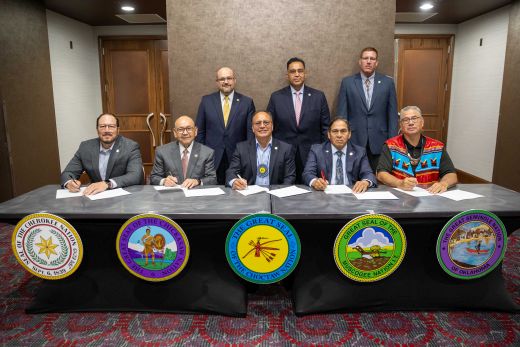Five Tribes to honor each other’s hunting and fishing licenses through reciprocity agreement

This article appeared in the August 2024 edition of the Chickasaw Times
TULSA, Okla. – Tribal members and citizens of the Cherokee Nation, Chickasaw Nation, Choctaw Nation of Oklahoma, Muscogee Nation and very soon Seminole Nation can utilize their tribal membership to enjoy hunting and fishing in participating tribes’ treaty territories.
The Inter-Tribal Council of the Five Civilized Tribes announced the Five Tribe Wildlife Management Reciprocity Agreement at its July quarterly meeting at the Hard Rock Hotel & Casino Tulsa July 12, allowing hunting and fishing licenses issued through each tribe to be recognized by the other tribes that are party to the agreement, on respective reservation land. Most tribes allow for their tribal membership cards to serve as their credential or license.
“Before recorded history, Chickasaw people engaged in sustainable management of natural resources and wildlife, as did our First American neighbors, as a means to sustain our families throughout the seasons,” Chickasaw Nation Governor Bill Anoatubby said. “Just as we now work to preserve our history and culture, we are also stewards of our natural resources and wildlife. For this reason, we are pleased to commit to the careful management of fish and wildlife by partnering with the Inter-Tribal Council for this agreement. This will enhance our efforts to effectively manage our wildlife conservation efforts, in accordance with all applicable laws, as it expands opportunities for sportsmen throughout the participating tribal territories.”
All Oklahoma residents with valid state-issued hunting and fishing licenses are eligible to hunt and fish within these tribal treaty territories in accordance with all applicable laws.
Hunting and fishing licenses were made available to tribal members in October 2022, and the council formed a working group to explore what would become The Five Tribe Wildlife Management Reciprocity Agreement at its quarterly meeting in April 2023.
This agreement will allow the Five Tribes to collaborate on wildlife management within their reservations and enhance their ability to effectively manage natural resources in a sustainable manner.
A resolution passed by the Council of the Five Tribes in 2021 set the groundwork for today’s agreement. That resolution focused on the fact that “each Nation has an inherent, recognized, and affirmed sovereign right and authority relating to the regulation and management of wildlife therein.”
Today’s agreement states hunting and fishing activities by tribal members and citizens under this agreement will be subject to the laws of the tribe on whose reservation the activity is taking place. The tribes are coordinating efforts to provide citizens and members with applicable safe hunting and fishing, and wildlife conservation laws of each reservation, which largely track similar standards in place under Oklahoma law. It is the responsibility of the individuals engaging in these activities in the various reservations to know and abide by any applicable laws. Tribal citizens will also be responsible for securing permissions to access land owned by others to engage in hunting and fishing, though each tribe will manage programs to provide access to tribally owned areas.
Tribal citizens or members reporting harvests will report this to the tribe to which they are a citizen or member. Hunting and fishing limits are considered aggregate statewide, and limits do not reset in or outside each reservation.
Each tribe will report basic harvest data each year by Feb. 28 to help regulate and manage wildlife. Personal data of the individual tribal citizens or members will not be reported to protect personal information.
State game wardens cross-deputized with the respective tribes can ticket and enforce laws on these reservations, as well. The tribes indicated that they look forward to working with state and federal partners as they implement this agreement and continue to identify partnerships for advancing wildlife conservation.
For more information about applicable laws in the Chickasaw Nation, the Chickasaw Nation Fish & Wildlife Service can be reached at (580) 310-6466 or CNRangers@Chickasaw.net.